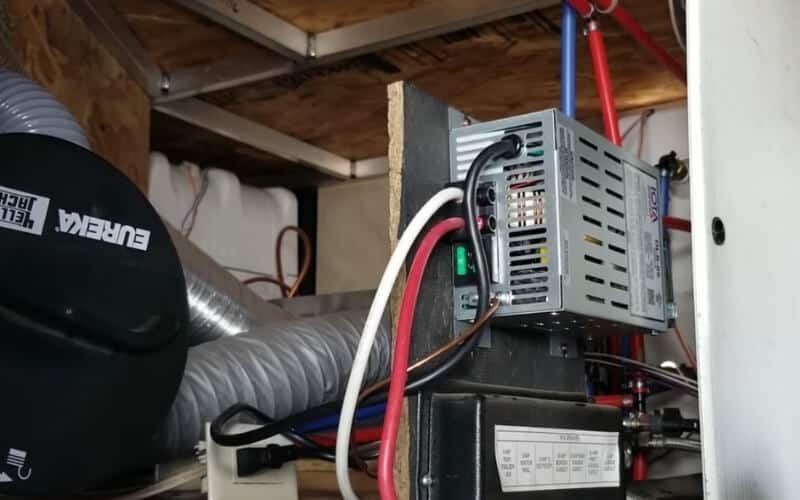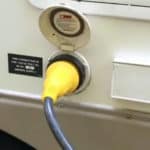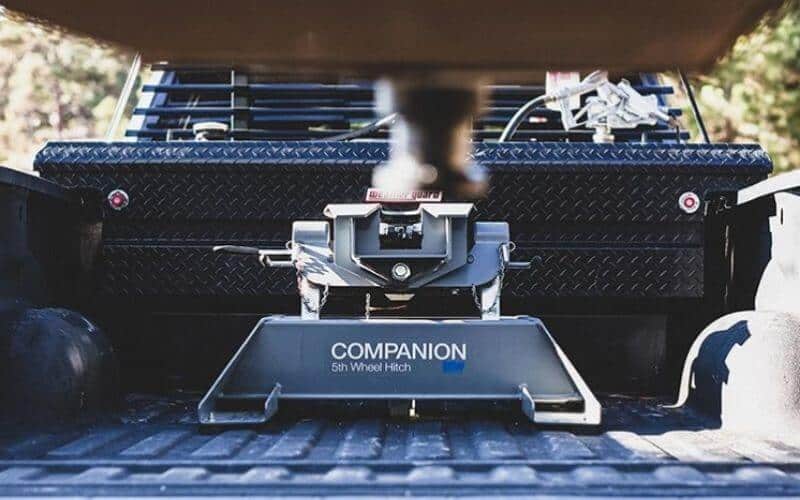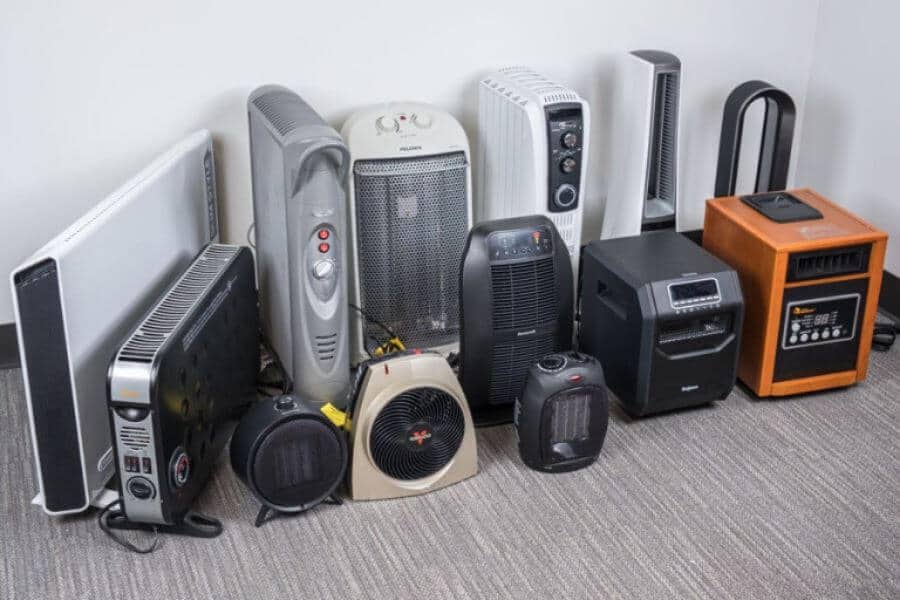The appliances in your RV require one of two different types of electricity. They will either run on direct current (DC) or alternating current (AC) power.
This isn’t really an issue until you consider that RV batteries can only supply power directly to appliances that require direct current.
For anything else, you’ll need to choose the best RV converter for your rig.
Most modern recreational vehicles are built with a converter. But, like anything, it’s possible for this component in your RV to break down or wear out over time.
Older RVs, as well, may not include a converter because their older appliances were designed to operate using DC power.
There are several other reasons why you might need a new converter for your RV.
If you’re attempting to install solar panels on your RV, for example, you may need to upgrade both your battery storage and converter capabilities.
Whatever the reason is that you’re exploring what the best RV converter for your RV might be, we’re here to help.
We’ve canvassed the current market to bring you some impressive converter models for you to ponder.
In addition, we’ve put together a comprehensive buying guide to help you understand the most important features and specifications to look for when you’re buying a new RV converter. So let’s get started!
The 8 Best RV Converter For motorhomes Reviews & Recommendations 2023
While you’re looking through these RV converters and chargers, pay close attention to what we liked and didn’t like about each of these models.
That will help you narrow down your options before you read through our Buying Guide!
RVs need to convert power into 12-volt direct current, or DC power So, Here are our top 8 picks for the best RV converter list:
1. Best Overall Power Converter: PowerMax PM3 110V to 12V DV Power RV Converter
The PowerMax PM3-100 Power Supply Converter is our top choice for the best RV converter because it boasts a 100-amp power capacity and it’s a three-stage converter and charger that not only supplies power for your DC electronics, but it also charges your RV battery.
The converter’s total dimensions measure 11” x 8.5” x 4.2”. This unit features adjustable power supply modes that allow you to customize your power supply.
This includes a 13.6-volt DC “absorption” mode and a 14.4-volt DC “bulk” mode.
It also features super quiet operation because it’s built with one of the quietest fans in the industry.
You’ll barely notice that this converter and charger is doing its job, which is, indeed, what you’d hope for!
Things We Like
Things We Don’t Like
2. Best 55 Amp Converter: IOTA 318.1402 Converter and Charger
If you’re looking for a 55 amp converter, the IOTA Engineering 318.1402 Converter and Charger is an excellent choice because it quickly and effectively charges your RV batteries while supply clean power to your 12-volt RV appliances.
It also has a low operating temperature that makes it great for RVers that like to chase the ‘Endless Summer’.
In addition, it’s equipped with safety protections to keep it from overheating and sustaining damage from excessive currents.
This converter and charger unit is also designed to withstand transient AC line voltage and it has dimensions that measure 9.7” x 5” x 3.4”.
It’s also compatible with IOTA’s IQ4 Charge Controller, which automatically controls the battery charging function of this converter and regulates weekly equalization to maximize the lifespan of your RV batteries.
Things We Like
Things We Don’t Like
3. Best 65 Amp Converter: Arterra WF-9865 Deck Mount Converter
Those of you in search of a 65 amp converter should look closely at the Arterra WFCO WF-9800 Series Deck Mount Converter Charger.
It’s rated for AC inputs between 105 and 130 volts and the unit itself measures 12” x 6.25” x 4”.
This unit features quiet operation because the cooling fan only turns on when it’s required by the electric load being handled by the converter and charger.
Like most of the units on our list, it provides safe power to your 12-volt appliances while also recharging your RV batteries.
For safety, it features fully insulated DC connections and an open-top design.
These features also make the installation process required to put this converter into action very simply and super fast.
And it also means that this three-stage converter supplies safe, clean power whenever and wherever you need it.
Things We Like
Things We Don’t Like
4. Best 60 Amp Converter: Progressive PD9260CV Inteli-Power Converter/Charger
If a 60 amp converter charger is what you’re looking for, then look no further than the Progressive Dynamics PD9260CV Inteli-Power 9200 Series Converter Charger.
It’s got a built-in charge wizard that limits electrical current and reduces the output when maximum capacity is reached.
This converter also features one of the most comprehensive lists of protections of any of the choices on our list.
For starters, it includes low line voltage protection that protects your more sensitive appliances from irregularities related to lower voltages.
It also boasts reverse battery protection that prevents damage that can result from improper connections to your battery leads.
In this way, it helps to protect against user error if you’re a first-time RVer or you’ve never replaced your converter before.
In addition, this converter features filtered DC power delivery for safer and more reliable service.
The unit itself measures 13” x 7” x 9” and it’s also equipped with a variable speed, intelligent cooling fan, and automatic thermal protection to prevent overheating when it’s running for several hours without interruption.
Things We Like
Things We Don’t Like
5. Best Budget-Friendly Converter: WFCO WF-9845 Series 45 Amp Deck Mount Converter
When you’re shopping for a new RV power converter and charger with a minimal budget, the WFCO WF-9800 Series Deck Mount Converter Charger is a possibility you should certainly consider.
This is a 45 amp converter that’s rated for AC inputs between 105 and 130 volts.
It offers many of the same features as the 65 amp WFCO converter and charger we mentioned above, including quiet operation and an open-top design.
That open-top design also makes this converter easier to troubleshoot and service if issues do arise.
And the fully insulated DC connections on this unit help to ensure safer handling when you’re first installing this converter.
Things We Like
Things We Don’t Like
6. Best 35 Amp Converter: WFCO WF8935PECB Converter/Charger For RV
If you have a small RV that only requires a 35 amp converter, you might consider the benefits of choosing a smaller unit like the WFCO Electronics WF8935PECB Converter/Charger.
This model is a three-stage battery charging system that’s equipped with two 30 amp fuses.
It’s one of the larger units in terms of dimensions. It measures 14” x 11.88” x 8.25” and it weighs about seven pounds.
It’s designed to provide a clean and consistent 13.6-volt DC output, but it also has three different power modes for you to choose from depending on the supply you require.
Those modes include a 13.2-volt DC range “float” mode, a 13.6-volt DC range “absorption” mode, and a 14.4-volt DC range “bulk” mode.
It also boasts an intelligent cooling fan that only turns on when the converter’s temperature exceeds a specified limit. That helps to ensure a quieter operation of this converter.
Things We Like
Things We Don’t Like
7. Best 75 Amp Converter: AIMS CON120AC1224DC AC Converter Battery Charger
For those of you that own larger RVs that require a 75 amp power supply, the AIMS Power CON120AC1224DC AC Converter & Charger is the best 75 amp converter on our list.
It’s a three-stage smart charger and converter that includes a built-in variable algorithm to help maximize your battery’s lifespan.
Speaking of batteries, this power converter is compatible with multiple different battery types, including lead-acid, gel cell, AGM (absorbent glass mat), and LiFePO4 (lithium-ion) batteries.
And, depending on the battery capacity, it can supply up to 75 amps at 12-volt DC and up to 37.5 amps at 24-volt DC.
This converter unit also features an adjustable-charge current control dial.
This dial helps you safely charge smaller batteries by giving this converter the ability to accept a wider range of AC inputs from 70 volts up to 140 volts.
It also boasts a very impressive AC-to-DC conversion efficiency of more than 80 percent and it’s equipped with many safety protections.
That includes protection against reverse polarity, short circuit, overheating, and high and low voltages.
Things We Like
Things We Don’t Like
8. Best Four-Stage Converter: Go Power 55 Amp 4-Stage Converter
If you’re intrigued by the performance and capacity of a multi-stage converter with four stages, then check out the Go Power! GPC-55-MAX 4-Stage Converter/Charger.
The four-stage design makes it ideal for recreational vehicles with larger battery banks because it’s capable of charging up to six batteries at once.
As you were probably thinking, this also makes it ideal for RVs with solar panel installations that often require the installation of additional batteries for power storage.
The unit itself measures 12” x 9” x 5” and it includes a 15 amp male plug for easy installation.
This converter and charger is designed specifically for flooded and wet cell batteries.
Its four-stage charging system provides protections for units that include multiple batteries because it equalizes the charge so that your batteries aren’t charged to uneven capacities.
Things We Like
Things We Don’t Like
Buying Guide of RV converter in 2023
Now that you’ve reviewed our selections for RV converters and chargers, it’s time to figure out how the heck you’re going to choose just one.
Make sure you consider each of these factors before you select a new converter for your RV, travel trailer, fifth wheel, or popup truck camper!
Converter Types
There are three basic types of RV converters that we’ve highlighted in our reviews above.
So let’s start by more clearly defining these two types and discussing their respective advantages and disadvantages.
High Output Converters
As their name suggests, high output converters are great for larger RVs with greater electrical demands.
Typically, these converters offer 80 amps or more so that they can provide power to multiple larger appliances at once.
These power converters are also designed to help protect your RV and its electrical system from some of the issues and risks that come along with a higher-powered system.
That includes protection against full discharge and extreme temperatures that can impact the longevity of your RV batteries.
Multi-Stage Converters
Multi-stage converters have become much more popular over the last several decades because of the more advanced electrical systems that are common in modern RVs.
They include an equalization procedure that enables them to produce cleaner DC power outputs and faster battery charging. It also makes them compatible with a larger variety of RV batteries.
These capabilities are really important for newer RVs that are equipped with more sensitive electronics and printed circuit boards.
To put it simply, this type of converter provides better protection for your RV batteries and sensitive appliances.
The only downside to this type of battery is that it can be more complicated to troubleshoot if you do run into any power supply issues down the line.
Your Power Supply Needs
Determining your power supply needs is as simple as adding up the required starting and running wattages for all of your RV’s various appliances.
To be on the safe side, you can just use the starting wattages for each appliance because that number should always be the larger of the two.
That being said, you may not actually need a power converter that can meet that large number you just added up.
That’s because it’s highly unlikely that you’ll be running all of your RV’s various appliances simultaneously.
If you do plan to, however, there’s little risk in choosing a larger converter. And, as a general rule, you can add 10 to 20 percent to the total starting wattages for all of your RV’s appliances.
The resulting number will allow you to identify an RV power converter that can meet all of your rig’s power supply needs.
The only downside of choosing a larger model is the additional size and weight of the converter unit itself.
So, if you’re trying to find an appropriate balance between having enough power supply and avoiding a super bulky and heavy model, consider how many of the large appliances in your RV you usually use at once.
For example, your refrigerator should always have a sufficient power supply from your batteries and converter.
If you frequently travel in places where you need to turn on your air conditioning unit to keep your RV cool, then you’ll need to add up the wattages for your A/C unit (or units) and refrigerator.
Then, you might turn on a few lights or switch on your water heater to do dishes while your refrigerator and A/C are running.
Plus, don’t forget that you and your partner both have your phones plugged into chargers and you like to watch television in the background while you’re cleaning up from dinner.
Oh, and that water you’re using to clean, it probably requires that your water pump is running.
So, you can begin to see how the wattages of your various appliances and electronic devices will add up quickly.
To be on the safe side, make sure you plan for operating multiple appliances simultaneously so that you ensure the converter you buy can handle those larger loads.
RV Size
Generally speaking, larger RVs will require more power. That’s because they’re usually packed with extra features and amenities that smaller rigs simply don’t have space for.
Some examples include washer and dryer units, larger entertainment systems, and refrigerators with higher capacities (and corresponding higher electrical needs).
Most RVs, however, are either designed to require a 30 amp or 50 amp electrical connection.
If your RV, travel trailer, or fifth wheel falls into the latter category, you’ll probably need a converter with a higher capacity than someone with a 30 amp rig.
Appliance Protection
As you might imagine, dealing with almost anything related to the electrical system in your RV comes with inherent risk.
When you’re choosing a new RV converter charger, you’ll also need to consider what safety features it includes to protect your appliances from electrical issues.
At a minimum, you should look for a model that includes thermal protection to prevent it from overheating.
This is increasingly important if you frequently travel in hot climates where the temperature surrounding the converter will already be on the warmer side.
Additionally, you can look for other protections from shock, short circuits, overcharging, reverse polarity, and overload.
And if you can find a model with some degree of ingress protection, that will help to prevent moisture, dirt, and other small debris from getting into your converter and damaging it beyond repair.
Battery Compatibility
The travel trailer power converter you choose must also be compatible with the batteries installed in your rig.
That’s because the converter will help to charge and discharge the power that is stored in these batteries for your use.
Single-stage converters are usually compatible with a smaller selection of battery types.
While they are more affordable than multi-stage converters and can be quite effective if used with the right type of batteries, they can have negative effects on non-compatible models.
For instance, charging a battery with an incompatible single-stage converter can result in excessive charging and discharging that ultimately leads to damage or a reduced lifespan of your battery.
Multi-stage converters tend to be compatible with a wider variety of battery types. It’s important to know that some converter manufacturers label their multi-stage models as ‘smart RV converter chargers’.
But, their multi-stage design helps to protect your batteries from overcharging. This extends your battery life by limiting the damage that can happen to batteries when overcharged (or excessively discharged).
Noise Output
Most power converters for RV use don’t make all that much noise when simply converting electricity to the proper current for your appliances.
But, most of the best converters out there come with some sort of built-in cooling fan.
When this fan starts running to cool things down, this is probably the only time you’ll audibly notice that your converter is working.
So, the good news is that most of these units don’t produce a ton of noise. But, as you might imagine, some pricier models have included components that help to dampen the noise output of that fan when it does turn on.
If you’re the type of person that needs absolute quiet to sleep at night, you’ll probably want to find a converter with as minimal noise output as possible.
Ease of Installation
Installing a new RV power converter isn’t overly complicated. But there are models out there designed to be mounted directly to the floor, subfloor, or sidewalls of your RV.
And there are others that can simply be set up and secured in a closet or the corner of a room.
While you can always hire a professional to install your converter (and we actually recommend doing so if you don’t have much experience messing with your RV’s electrical system), you’ll still need to choose a model that’s compatible with the design of your electrical system.
Fortunately, you’ll simply be able to look at how your old converter was installed in order to identify a compatible converter in most cases.
If you do want to change things up, however, you’ll need to get access to a given converter’s owner’s manual and read through its installation process fully to make sure it’ll work for your RV.
Of course, there may be several questions or concerns that come to your mind as you’re reading through that owner’s manual.
So, don’t forget that you can always reach out to the converter’s manufacturer directly for more advice on the proper installation process for a given model.
Price
Once you’ve considered all of these other factors, your choice is probably going to come down to how much you’re willing to spend on a new power converter for RV use.
Only you know your personal budget, but we think it’s important to remember that “you get what you pay for” in terms of quality, longevity, and performance.
That being said, there is a reasonable middle ground that you can find when you’re searching through these converter models.
While there are designs out there that are advertised for more than $200 and others for less than $120, we’d recommend choosing a model in the $150 to $250 range if you want to get a quality RV converter without overpaying.
So, Which Is Best For You?
Obviously, the answer to this question is going to depend on the type of recreational vehicle you own and your personal preferences.
But these are some specific scenarios that each of these converters is best for.
Our choice for the best overall RV power converter is the PowerMax PM3-100 Power Supply Converter.
That’s because it offers the highest power capacity of all the converters on our list and it’s also available at a very reasonable price.
If you’ve identified 55 amps as your threshold for power capacity, check out the IOTA Engineering 318.1402 Converter and Charger.
The coolest part about this unit is that it’s compatible with a remote charge controller that regulates weekly equalizations and increases your battery’s longevity.
Those of you in search of a 65 amp converter should look more closely at the Arterra WFCO WF-9800 Series Deck Mount Converter Charger.
It boasts fully insulated DC connections for safe handling and an efficient cooling fan that only turns on under certain electric loads.
The Progressive Dynamics PD9260CV Inteli-Power 9200 Series Converter Charger is the ideal choice for RVers that require a converter with a 60 amp power supply capacity.
It’s also a great choice because of its safety features, which include thermal protection, current limits, low line voltage protection, and reverse battery protection.
If you need to replace the converter and charger in your RV but you’re on a tight budget, you’ll probably like the WFCO WF-9800 Series Deck Mount Converter Charger.
This RV power converter and charger features an open-top design that’s ideal for anyone interested in troubleshooting or servicing their own converter down the line.
If you have a smaller RV, travel trailer, or fifth wheel with minimal power needs, you’d do well to consider the WFCO Electronics WF8935PECB Converter/Charger.
This is a 35-amp converter that allows you to choose from three different power modes and includes an intelligent cooling fan to keep the unit from overheating.
The AIMS Power CON120AC1224DC AC Converter & Battery is an excellent choice for owners of larger rigs because it’s rated for a power capacity of up to 75 amps.
It also features a bevy of important safety protections and it boasts excellent AC-to-DC power conversion efficiency.
Finally, if you’re most interested in a multi-stage converter with four stages, look no further than the Go Power! GPC-55-MAX 4-Stage Converter/Charger.
This four-stage RV power converter is ideal for RVs with solar panel installations that have additional batteries because it’s capable of charging up to six batteries at a time.
Frequently Asked Questions
Unless you’re a skilled electrician, messing with your RV’s electrical systems can be quite daunting.
So we’ve taken some time to answer the most Frequently Asked Questions about RV converters, how to install them, how to maintain them properly, and more.
What size RV converter should I choose?
Finding the right size converter for your RV depends on the specific power requirements of the appliances that you plan to operate at one time.
So, start by checking the starting and running wattages of your RV’s primary appliances.
Of course, the more appliances that you want to be able to run, the larger converter you’ll need.
And, additionally, you’ll need to consider the size of those appliances and how many you plan to run simultaneously.
When you’re comparing the size of any two RV power converters, look closely at their specifications for surge power and continuous power.
A converter’s continuous power rating will tell you how much wattage it can handle when multiple appliances are running simultaneously.
The surge power rating, on the other hand, will tell you how large of an initial surge the converter can handle when, and if, you start multiple appliances at the same time.
How do I know if my converter needs to be replaced?
In many cases, it can be difficult to tell that your converter has gone bad until it has ceased to function entirely.
For this reason, it can always be a good idea to have a backup converter at the ready so that you’re not left high and dry when your existing converter fails.
That being said, a tell-tale sign that your converter needs to be replaced is that you’re having trouble getting power to any appliances that you previously had no problem powering up when you relied on battery power alone.
This includes, but isn’t limited to, certain RV lights, your water pump, and motors that move your RV’s slide-outs.
The problem with finding out that your converter needs to be replaced before it fully ceases to function is that it can be hard to notice these symptoms until the charge on your onboard 12-volt batteries has been fully drained.
If this happens, you’ll often be required to replace both your converter and your batteries.
How to test an RV power converter?
If you want to test your power converter to try to avoid it fully ceasing to function and draining your RV batteries, you’ll need a voltage meter.
You’ll then need to identify the electrical wires that provide power input and output to your converter charger.
By using your meter to test the voltage that’s coming into and out of your converter, you can identify whether your electrical issue is isolated to your converter or whether there’s a larger issue.
Depending on the converter you have and your RV’s power needs, there can be a bit of nuance to this test.
So, check out this convenient YouTube video for more info on how to test and troubleshoot an RV converter!
If your RV converter not charging battery, then read our article how to fix RV converter charging problem.
How to replace an RV converter and charger?
The good news is that replacing an old and malfunctioning power converter isn’t an overly-complicated process.
In short, it involves disconnecting your old power converter, removing it, and installing the new converter in its place.
There are several safety precautions you should take before you do this, however. For starters, make sure your RV isn’t plugged into any source of external power.
Then, power down all appliances and shut off any breakers that usually draw a charge from your battery and converter.
Finally, you can disconnect the electrical connections running from your RV batteries back to your converter.
This will ensure that no power is running through the converter before you remove and replace it.
Do RV converters come with a warranty policy?
Obviously, this will depend on the exact power converter that you choose. But, generally speaking, most models come with a warranty policy that extends for a period of one to five years.
The exact damages, repairs, and replacements that a company’s warranty policy will cover, however, can vary quite a bit.
So, the best way to determine the exact coverage you’ll be getting is to read closely through the manufacturer’s warranty policy before you finalize your purchase.
While this might not be the first specification you use to determine the right converter for your RV, it can be helpful when you’re down to deciding between two designs that are very similar in all other areas.
When you’re purchasing an RV power converter and charger online, you should also be careful to make sure it comes with a valid serial number.
This number will be required to verify ownership of the converter and you’ll need to require it when requesting any service work that’s covered under the manufacturer’s warranty policy.
Conclusion
We know that shopping for a new converter for your RV isn’t the most glamorous endeavor.
But when you’re on the road for days, weeks, or even months at a time, reliable power is going to be something that you don’t want to live without.
So, we hope that you’ve found at least one option on our list today that you feel is the best RV converter for your recreational vehicle.
And we also have our fingers crossed that you learned a thing or two about these converters along the way. As always, best of luck with all of your upcoming RV adventures!














![5 Best RV Satellite Dishes and Antenna for RVs & Camping in [currentyear] 22 Best Portable RV Dish Antenna To Get Satellite Internet And TV On The Go](https://www.rvingknowhow.com/wp-content/uploads/2022/05/Best-Portable-RV-Dish-Antenna-To-Get-Satellite-Internet-And-TV-On-The-Go.jpg)